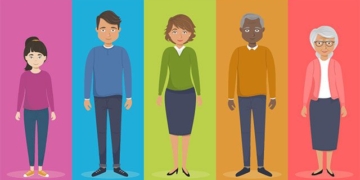The Lunar Kỵ Day is a popular concept in Vietnamese folklore. The Lunar Kỵ Day is considered one of the worst days of the year. For this reason, there are many activities that should be avoided on this day to prevent bad luck from coming your way. Let’s explore the Lunar Kỵ Day and the important things to keep in mind on this day!
Important Facts About Lunar Kỵ Day
What is Lunar Kỵ Day – Tam Nương Day?
Lunar Kỵ Day, also known as Tam Nương Day, according to folklore, is a day when important tasks should not be undertaken. It is believed that the energy of women in the family weakens on this day, making it unfavorable for significant events such as weddings, house construction, or funerals.
The Origin of Lunar Kỵ Day in Folklore
According to Vietnamese folklore, the origin of Lunar Kỵ Day can be traced back to the story of Ba Vương – the three princes and Tam Nương – the three princesses. Ba Vương and Tam Nương are mythological deities who became entangled in a war. At the end of the conflict, Ba Vương emerged victorious, and Tam Nương was exiled to the desert. Subsequently, Ba Vương became the Emperor, and Tam Nương became the Moon Goddess. Since then, it has been believed that Tam Nương affects human health and fortune, leading to the designation of Tam Nương Day as Lunar Kỵ Day.
According to legend, Tam Nương are beautiful yet ruthless deities. They descend to the earthly realm to enchant people, leading them into gambling, drinking, and debauchery, resulting in misfortune. Therefore, it is believed that on Tam Nương Days, individuals should exercise caution and avoid significant activities to prevent Tam Nương’s interference.

Lunar Cycle.
Lunar Kỵ Day from a Scientific Perspective
From a scientific viewpoint, Lunar Kỵ Day can be explained as follows:
The Influence of the Moon on Tides
According to modern science, the Moon exerts a significant gravitational pull on Earth and other planets in the Solar System. This gravitational force causes high and low tides in oceans and large rivers. High tide occurs when sea levels rise to their highest point of the day, while low tide happens when sea levels drop to their lowest point. The changes in sea level depend on the Moon’s position relative to Earth and the Sun.
When the Moon, Earth, and Sun align, their gravitational pulls combine to create the largest high tide effect. This phenomenon is known as spring tide, or Kỵ tide. Conversely, when the Moon is positioned at a right angle to Earth and the Sun, their gravitational effects counterbalance each other, resulting in the lowest high tide effect, known as neap tide or lunar tide.
Lunar Kỵ Days are those when the Moon, Earth, and Sun align, creating the largest Kỵ tide. These days negatively impact human activities and the environment. For instance, Kỵ tide can lead to flooding, tsunamis, coastal erosion, and adversely affect marine life, agriculture, and transportation.
The Influence of the Moon on Health and Psychology
The Moon also affects human health and psychology. People often report feeling fatigued, stressed, and anxious during full moon days. This may be attributed to changes in biological rhythms and hormone levels in the body.
Statistical Coincidence
Many believe that Lunar Kỵ Day is an unlucky day because accidents and misfortunes frequently occur on these days. However, this may simply be statistical coincidence. In reality, accidents can happen on any day, not just on Lunar Kỵ Day.
Stages of the Menstrual Cycle
The menstrual cycle is a natural physiological process that occurs in women from puberty to menopause. A normal menstrual cycle lasts between 24 to 38 days, with menstruation lasting about 2 to 7 days.
The menstrual cycle can be divided into three main phases:
- Menstrual Phase: This is the initial phase of the menstrual cycle when the uterine lining sheds and exits through the vagina. The menstrual phase typically lasts from 3 to 7 days.
- Ovulation Phase: This is the phase when an egg is released from the ovaries. The ovulation phase usually lasts from 10 to 16 days.
- Premenstrual Phase: This is the final phase of the menstrual cycle when the body prepares for the next menstruation. The premenstrual phase usually lasts from 7 to 14 days.
Menstrual Phase
During the menstrual phase, a woman’s body produces estrogen and progesterone hormones to prepare for ovulation. When the levels of estrogen and progesterone decrease, the uterine lining sheds and exits through the vagina.
Ovulation Phase
In the ovulation phase, an egg is released from the ovaries. This egg travels down the fallopian tube and may be fertilized by sperm.
Premenstrual Phase
During the premenstrual phase, a woman’s body produces estrogen and progesterone hormones to prepare for a new menstrual cycle.
Lunar Kỵ Day
Lunar Kỵ Day is a day when women should refrain from undertaking important tasks, such as weddings, groundbreaking ceremonies, and business activities. According to folklore, Lunar Kỵ Day is believed to be a time when women experience psychological instability and are more susceptible to external factors. Therefore, if significant activities are conducted on Lunar Kỵ Day, one may encounter unfortunate events.
Things to Avoid on Lunar Kỵ Day
Lunar Kỵ Day is considered an unfavorable time to carry out important activities. Here are some principles and guidelines on what to avoid on Lunar Kỵ Day:
Avoid Major Activities
On Lunar Kỵ Day, tradition states that major activities such as weddings, house construction, or funerals should not be conducted. These events are viewed as unlucky and may pose risks to the family.
Be Cautious When Going Outside and Traveling by Water
Lunar Kỵ Day is also regarded as an unfavorable day for going outside or traveling by water. Traditionally, it is believed that accidents or unforeseen risks may occur on this day. Therefore, everyone is advised to be cautious and avoid outdoor activities on Lunar Kỵ Day.


















































